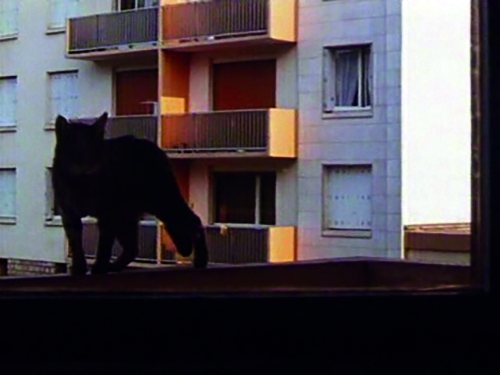
Set in the late 60s, on the perimeters of an American army base somewhere outside Paris, it finds 15-year-old Martine (Alice Houri) struggling to come of age, having just learned that her best friend, Marlene, has recently lost her virginity – a distinction that threatens the two girls’ relationship.
EN
“And indeed, Denis’s sixty-four-minute film, U.S. Go Home, evokes how centrally music – and especially music from Britain and the United States – shaped French adolescence in the 1960s, and how dance is a ritual that allows a convergence, even if fleeting and temporary, of private and public selves. Initally, Denis was somewhat ambivalent about the project. “I could have said yes or no. I hated parties, but I was excited about the importance of music in the series. When I was an adolescent, my records and record player were my secret. Alone in my room, I listened to the Animals, the Yardbirds, Ronnie Bird. The idea of using their music was a powerful motivation to make the film.” [...]
The first image of U.S. Go Home shows us Alain, sitting on his bed and reading aloud from a well-known text by Seneca, “On the Shortness of Life,” about how giving in on one’s sexual desires is a sign of weakness:
Among the worst offenders I count those who give all their time to drink and lust; that is the sorriest abuse of time of all. Though the phantom of glory which possesses some men is illusory, their error, at all events has a creditable look. And even if you cite the avaricious, the wrathful, and those who prosecute unjust hatreds and even unjust war, these too are more manly kinds of sin. But the stain upon men abandoned to their belly and their lusts is vile.
Behind him is hideous, typically 1960s wallpaper with a geometric design, strategically decorated with record album covers. There is a certain nostalgia evoked in the décor as well as in the text that Alain reads aloud. It is as if, within the iconography of the 1960s, teenagers like Alain were finding their way amid both the music of the era and the philosophy they try on for size. In both cases, models of masculinity promise strength and power. If Seneca’s philosophy gives Alain a model of masculine purity to emulate, dance gives him something else as well, a physical acting out of desire, frustration and creativity.”
Judith Mayne1
“A dance: following your body, feeling the space around you, always moving, always participatory. Even if you’re dancing alone, you’re still dancing with somebody. It starts from expression. There’s George Bernard Shaw’s quip that dancing is a vertical expression of a horizontal desire, of course, and that’s quite often true, especially among the young and horny. More curious is the elemental teenage desire for self-expression—if we understand that as articulating one’s individuality – though dancing to pop music is so often based on repetition. When teens dance it’s kind of a matching game, where very few try to one-up one another. Part of the game, always, is to impress, but you’ll surely dance yourself into a lonely corner if you can’t dance with anybody but yourself. You can’t force it. You have to feel it, and let it build. You give yourself. [...]
The party (the movie) may not be allegory, but the political is hardly an afterthought. The title of the film itself and the repetition of all this commodified pop music begin to sound suspect, or curious. Who’s demanding the U.S. go home, anyway? In the end, we only hear Martine say the line, parroting a protest she could care less about, another sign of teenage flippancy – and the peculiar hypocrisy, or at least irony, of this film’s world. No big surprise that Anne Wiazemsky, that princess of the left, co-wrote the scenario with Denis, casting over the provincial idyll an American shadow and coloring the petulance of a line like, ‘I’m a Communist, I don’t drink Coca-Cola,’ with doubt and a little amusement. The joke’s on the kids, almost, as they’re rootless pinballs. It just so happens that Alain is the right age to be seduced by the Red and that Martine recollects a leftist anthem (that her brother no doubt introduced her to) in the face of an American.”
Ryland Walker Knight2

